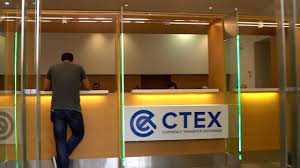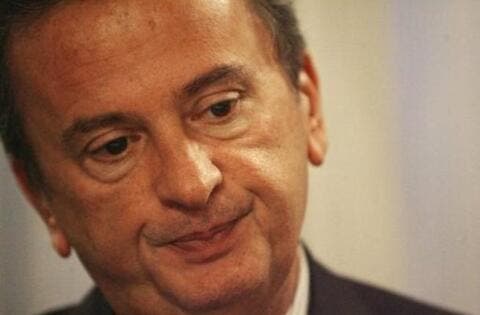Lebanon’s Central Bank Governor Riad Salameh denied on Friday any links to U.S. sanctioned CTEX money exchange company and its owner Hassan Moukalled, who allegedly facilitated Hezbollah activities,
Commenting on the recent U.S. sanctions CTEX its owner and their support for Hezbollah Salameh noted that the company was granted a license “in line with the Lebanese laws.”
“This license came after the request was studied by central bank authorities and this company was established in the U.S. and the UAE,” Salameh added, noting that there are no “special relation” linked him to it.
“The work of the CTEX company and the other companies is to sell dollars to the central bank and not the opposite and we emphasize that this process has nothing to do whatsoever with Hezbollah’s financing,” the governor went on to say.
The sanctions imposed in January by the US Department of the Treasury’s Office of Foreign Assets Control on Moukalled have further exposed the extent to which Hezbollah has entrenched itself in the country’s financial and political system.
The new measures have also put Lebanon’s central bank under further scrutiny.
Who is Moukalled?


Hassan Moukalled is at “the centre” of a network that “plays a key role in enabling Hezbollah to continue to exploit and exacerbate Lebanon’s economic crisis”, according to the US Treasury.
The department announced sanctions on Moukalled and his businesses, as well as his sons Rayyan and Rani, for enabling financial activities “in support of Hezbollah”.
The elder Mr Moukalled frequently appears on Lebanese television as an economy commentator. He is also the owner of a large money service business, CTEX — licensed by Lebanon’s central bank — which the US Treasury has referred to as a financial front company established on behalf of Hezbollah.
The US Treasury accuses Mr Moukalled of engaging in financial engineering for Hezbollah in support of the Iran-backed party’s interests “at the expense of the Lebanese people and economy”, according to Under Secretary of the Treasury for Terrorism and Financial Intelligence Brian Nelson.
The wording of the US Treasury statement is reminiscent of the criticism lobbed at Salameh, who is under domestic and international investigation for money laundering and embezzlement, among other financial crimes.
The central bank governor has been accused of financially engineering a scheme which for decades propped up the country’s economy before a liquidity shortage caused it to come crashing down in 2019 — causing what the World Bank has called one of the worst economic crises in modern history.
The US Treasury sanctions a major money exchanger in Lebanon. The press release mentions "Central Bank of Lebanon" five times & characterizes the sanctioned persons as agents of & intermediaries between Hezbollah & the Central Bank. Are sanctions against the Central Bank coming? pic.twitter.com/ujJar0eKJd
— Mike Azar (@AzarsTweets) January 24, 2023
The central bank is mentioned several times in the US Treasury statement announcing sanctions on Mr Moukalled and his sons. It also highlights Moukalled’s role as an intermediary between Hezbollah and the central bank and emphasises the bank’s licensing of his money exchange company.
Within a year of licensing CTEX, “the company had obtained significant market share within Lebanon’s currency transfer sector and was reportedly collecting millions of US dollars for the central bank of Lebanon,” the US Treasury statement said. It added that the company was simultaneously providing money to Hezbollah institutions.
Experts say the US Treasury’s calling out of the central bank’s role in profiting from CTEX operations is a warning to Salameh that he will no longer be shielded by political cover.
Karim Bitar, a professor of international relations at the University of Saint Joseph in Beirut, said it is no coincidence the US Treasury chose that phrasing while announcing the sanctions on Moukalled and his sons.
“They used it to send a message to both Hezbollah and the central bank,” he was quoted. as saying by The National.
“Before, whenever he faced accusations of embezzlement, money laundering, mismanagement and creating a Ponzi scheme, Salameh would always present himself as a victim of a conspiracy orchestrated by Hezbollah and its allies.”
Salameh’s defense strategy of claiming to be a scapegoat “because he resisted Hezbollah’s attempts at controlling the banking system” has been undermined by the issuance of the sanctions, which confirm the central bank’s involvement in enriching the party, Mr Bitar said.
The Iran-backed militant group has been designated as a terrorist organization by the US and a number of Arab and western countries. But Hezbollah is also a political party that is allied with a number of Lebanon’s political parties.
More denials
Asked about Forry Associates Ltd — a British Virgin Islands-registered company that lists Salameh’s brother Raja as its owner and is suspected of having brokered Lebanese treasury bonds and Eurobonds at a commission – the governor said that “no single dollar from the central bank’s money was paid to Forry.”
“I have nothing to do with this company and some took advantage of my brother’s work at the company to target me,” Salameh added, noting that “all documents are present at the judiciary.”
News Agencies


Leave a Reply
You must be logged in to post a comment.